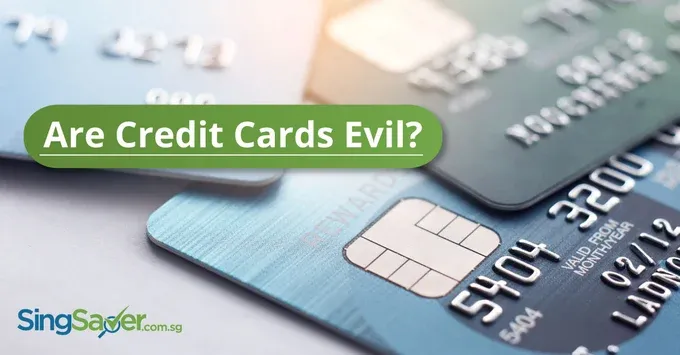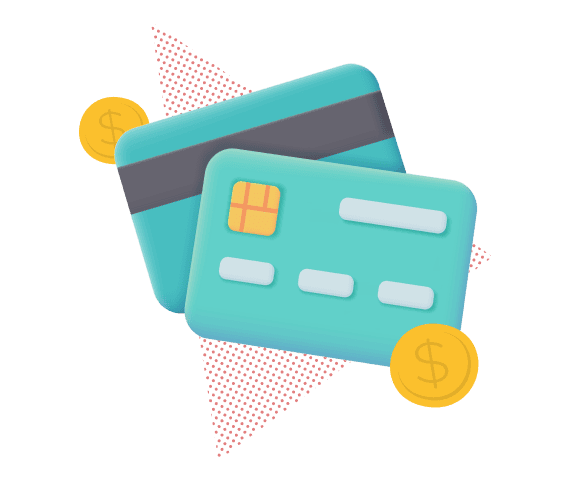Are Credit Cards Good or Bad?
Updated: 22 May 2025
Credit cards can be powerful tools or costly mistakes — it all comes down to how you use them.
Written bySingSaver Team
Team

The information on this page is for educational and informational purposes only and should not be considered financial or investment advice. While we review and compare financial products to help you find the best options, we do not provide personalised recommendations or investment advisory services. Always do your own research or consult a licensed financial professional before making any financial decisions.
In Singapore, credit cards are a common part of daily life, from tapping in at MRT stations to paying for meals, online shopping, and travel bookings. But while they offer impressive convenience and rewards, mismanaging your card can lead to mounting debt and financial headaches. Let us take a balanced look at the benefits and drawbacks of credit cards — and how to make them work for you, not against you.
How credit cards benefit you
From cashback to travel perks, discover how using the right credit card can boost your everyday spending.
The benefits of credit cards
Used wisely, credit cards can unlock savings, rewards, and even better financial opportunities. Here is how.
Easy, convenient purchases
Credit cards make everyday spending seamless. Whether you are shopping online, booking a flight to Japan, or tapping your phone using Apple Pay or Google Pay at your local FairPrice, payments are instant and fuss-free.
Contactless payment features — such as tapping your card or mobile wallet — are especially useful in Singapore, where many stores, transport systems, and even hawker stalls now accept PayWave or QR payments. You can also set up recurring payments for essentials like Netflix Singapore, Spotify, or your monthly utilities bill, saving you time and effort.
» Every purchase should be on a credit card – find out why
The ability to build credit history
Your credit card behaviour feeds into your credit report, managed by the Credit Bureau Singapore (CBS). Every on-time payment boosts your creditworthiness, while late or missed payments chip away at it.
A strong credit history is crucial when applying for major loans later on — think housing loans for your HDB flat, car loans, or even personal credit lines. Starting good repayment habits early can open doors to better loan approvals and lower interest rates in the future.
» Learn how to build your credit score
Valuable perks and rewards
Many Singapore credit cards offer attractive rewards. Cashback cards like the UOB One Card or DBS Live Fresh can help you save on groceries, transport, and online shopping. Meanwhile, miles cards such as Citi PremierMiles or DBS Altitude let you accumulate KrisFlyer or Asia Miles points to offset your next holiday expenses.
In short, cashback gives you money back based on your spending, while miles can be redeemed for travel rewards. Choosing the right rewards programme based on your lifestyle is key to maximising your returns.
» Browse the best rewards credit cards
Protection for purchases and travel bookings
Paying with a credit card can also provide added security. Many cards include purchase protection (e.g. covering loss or damage within a certain period) and extended warranties on products.
For travel, credit cards often come with complimentary travel insurance, covering trip cancellations, flight delays, or baggage loss — a major perk if you are booking flights to spots like Bali or Bangkok, especially with ongoing travel uncertainties.
» Catch the roundup on best credit cards for airline tickets and hotels
Quick reimbursement for fraudulent charges
If you spot a suspicious charge on your credit card statement, do not panic. Most banks in Singapore have zero liability policies, provided you report unauthorised transactions promptly.
For instance, DBS and OCBC offer dedicated fraud hotlines and immediate investigations into reported fraud. Acting fast protects you and ensures you are not held responsible for fraudulent spending.
» Is it safe to make credit card payments over the phone? Find the answer
The drawbacks of credit cards
While credit cards come with clear advantages, it is important to be mindful of the potential downsides — most of which are entirely avoidable with good habits.
High interest rates
Credit card interest rates in Singapore typically range from 24% to 28% per annum if you carry a balance. This adds up quickly.
For example, if you owe just S$1,000 and only pay the minimum amount each month, it could take years — and hundreds of dollars in interest — to clear the debt. Paying your balance in full each month helps you avoid these costs altogether.
» Find out exactly how credit card interest works
The ability to add onto existing debt
With multiple cards or easy instalment plans like buy-now-pay-later (BNPL), it is tempting to keep spending without immediately feeling the pinch. However, accumulating debt across various cards can spiral out of control.
Remember: credit is not free money. Every purchase will eventually need to be repaid — with interest, if not managed carefully.
» Clear credit card debt with our step-by-step guide
Potentially confusing terms and conditions
Not all rewards are straightforward. Some cashback or miles promotions require a minimum monthly spend, limit rewards to specific categories, or have tight validity periods.
Always read the fine print or use card comparison tools like SingSaver’s guides to ensure you fully understand how your card benefits work — and how to qualify for them.
» Understand confusing credit card fine print
How to use credit cards responsibly
The good news? Building healthy credit habits is simple once you know what to look out for.
Pay bills on time
Late payments incur hefty fees and interest, and they damage your credit score. Set up GIRO payments or mobile banking alerts to ensure you never miss a due date.
Automating payments where possible takes the stress out of remembering deadlines.
» Don’t just make the deadline, time your payments strategically for maximum rewards
Try not to use too much of your credit limit
Your credit utilisation ratio — the percentage of your credit limit that you use — also affects your credit score. Ideally, you should keep it below 30%.
For instance, if your card has a S$10,000 limit, try to stay under S$3,000 in outstanding balances at any given time. This signals to banks that you are managing your credit well.
» Manage your credit limit successfully with our guide
Keep credit card accounts open for a long time
The length of your credit history matters. Keeping your first credit card account open — even if you no longer actively use it — can help maintain a strong, long-standing credit record.
Unless there is a compelling reason to cancel (such as high annual fees without sufficient rewards), keeping old accounts active can work in your favour.
» Learn how credit history works alongside other factors to make up your credit score
A card for every purchase, or one card to buy them all?
Weigh the pros and cons of holding one, two, or even five cards — and how to find the right balance for your lifestyle.
About the author
SingSaver Team
At SingSaver, we make personal finance accessible with easy to understand personal finance reads, tools and money hacks that simplify all of life’s financial decisions for you.
